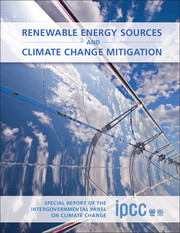 Renewable Energy Sources and Climate Change Mitigation
Renewable Energy Sources and Climate Change Mitigation Book contents
Foreword
Published online by Cambridge University Press: 05 December 2011
Summary
The IPCC Special Report on Renewable Energy Sources and Climate Change Mitigation (SRREN) provides a comprehensive review concerning these sources and technologies, the relevant costs and benefits, and their potential role in a portfolio of mitigation options.
For the first time, an inclusive account of costs and greenhouse gas emissions across various technologies and scenarios confirms the key role of renewable sources, irrespective of any tangible climate change mitigation agreement.
As an intergovernmental body established in 1988 by the World Meteorological Organization (WMO) and the United Nations Environment Programme (UNEP), the IPCC has successfully provided policymakers over the ensuing period with the most authoritative and objective scientific and technical assessments, which, while clearly policy relevant, never claimed to be policy prescriptive. Moreover, this Special Report should be considered especially significant at a time when Governments are pondering the role of renewable energy resources in the context of their respective climate change mitigation efforts.
The SRREN was made possible thanks to the commitment and dedication of hundreds of experts from various regions and disciplines. We would like to express our deep gratitude to Prof. Ottmar Edenhofer, Dr. Ramon Pichs-Madruga, and Dr. Youba Sokona, for their untiring leadership throughout the SRREN development process, as well as to all Coordinating Lead Authors, Lead Authors, Contributing Authors, Review Editors and Reviewers, and to the staff of the Working Group III Technical Support Unit.
- Type
- Chapter
- Information
- Renewable Energy Sources and Climate Change MitigationSpecial Report of the Intergovernmental Panel on Climate Change, pp. viiiPublisher: Cambridge University PressPrint publication year: 2011


